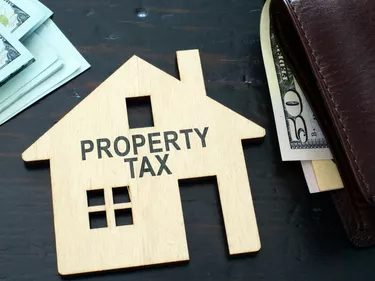
Many homeowners never even have to think about paying their property taxes. Their mortgage lenders include one-twelfth of the yearly amount in each of their monthly mortgage payments and remit the taxes on their behalf. It's a process known as "escrowing."
However, if their lenders don't do this, homeowners have to pay these taxes separately on their own. Should you fall on hard times, a loving family member or generous family friend can go to the tax office and pay the balance for you. If you don't have this type of help, and your taxes become delinquent, the taxing authority may issue a tax lien on your home, or sell the home at auction. Depending on the laws in your state, an investor may come along and satisfy that lien in exchange for the property.
Video of the Day
Video of the Day
Tip
Investors can acquire the right to foreclose or simply take ownership of a home when they pay property taxes on a home with a tax lien.
Tax Liens Have Priority
Unpaid property taxes become a lien against the real estate. It's a first-priority lien, so it takes precedence over even mortgages. This means that were a house to be sold, the taxes would be paid first out of the proceeds. Other liens, including the mortgage balance, would only get anything that's left over.
The tax lien is held by the taxing authority, which is generally the local government. Depending on state law, the taxing authority can use the lien to foreclose on the home and sell it in a tax sale to collect on the lien. Or it might sell the lien instead, which gives the buyer the right to take the property.
Paying Someone Else's Property Taxes
Tax liens are sold in a variety of ways, depending on the state. First, notice of tax delinquency will typically be published in the local newspaper, alerting investors as to what's going on. In most states, the taxing authority does not have to take the property owner to court first before initiating this process.
The taxing authority might then simply sell the home at auction, satisfying the tax lien from the buyer's funds. In other states, the taxing authority will auction off a tax lien certificate instead, rather than the actual property. Bidders can "win" the certificate by paying the property taxes on the homeowner's behalf.
The certificate allows the winning bidder to eventually take ownership of the property, usually by foreclosing on it. But in some states, after a period of time, the certificate might automatically convert to a deed in the buyer's name.
The Redemption Period
Tax lien certificates come with a right of redemption. The homeowner can rebuy the property within a given period of time if it's been sold outright, paying the sales price plus interest and some other additional costs and fees as well. The purchaser doesn't officially own the home until the redemption period passes and the homeowner hasn't taken action during that time.
In the case of a tax sale certificate rather than sale of the property, the homeowner can usually redeem the certificate by paying the purchaser the amount of taxes paid on their behalf, plus interest and possibly penalties.
The duration of redemption periods varies by state law, but it can be as long as a year. Some taxing authorities offer additional redemption periods before they sell the property or a tax lien certificate on it.
If the Mortgage Lender Pays the Taxes
Lenders don't want to see any of this happen any more than homeowners do. Remember, that a mortgage doesn't hold top priority for payment in a tax sale.
Mortgage lenders will often step in to pay outstanding property taxes in this situation. Of course, the amount will be added to the homeowner's mortgage balance, or they'll receive a bill for the taxes paid on their behalf, and that could result in foreclosure if the lender isn't reimbursed.